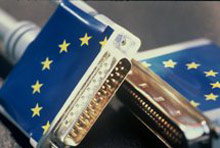
The EU released it’s annual digital agenda scoreboard this week. The report highlighted several positive trends, such as that consumers and business are quickly moving to mobile (62% growth in mobile internet use and 217 million mobile broadband subscriptions), internet usage is widespread as 68% of Europeans are online regularly and 170 million use social networks, and virtually all citizens (95%) now have broadband access. In addition, the EU also seem to be making fairly good progress on the numerous digital agenda targets they laid out a couple years back. However there were several areas where Europe continues to lag:
1. Only 43% of the EU population has medium or high Internet skills (defined as being able to perform tasks such as “using the Internet to make a phone call or create a web page”) and only 50% are confident that they have the internet and computer skills necessary for the rapidly changing labor market. As you would probably expect, this is resulting in a hiring challenge for Europe’s IT sector as job vacancies are expected to hit 700k by 2015
2. Growth in SMEs using eCommerce has stalled, limiting their growth and opportunities to expand into new markets
3. While eCommerce is still growing with European consumers as 58% now shop online, it’s still largely a national exercise as only 10% have purchased something from a website based in another EU country.
4. The EU is falling behind it’s main competitors, particularly the US, in terms of research investments. With a goal of doubling R&D investments by 2020, member states need to, on average, be generating 6% annual growth in research investments to hit this goal.
5. On the telecoms front, EU consumers are still paying way too much for roaming charges (approximately 3.5x national rates), regardless of efforts by the EU to encourage telcos to push these charges down to levels that mirror national rates.

The EU has several proposals they’re hoping will properly tackle these problems including new roaming regulation, putting into place a ‘Connecting Europe Facility’ with €7billion allocated to encourage private investment in broadband and key online services (ie eProcurement), substantial investment in research and innovation, and an ecommerce action plan to facilitate cross-border commerce. As mentioned in a couple previous articles, they’re also currently working on identifying strategies on cloud computing and internet security which will be announced by end 2012.
As for France, there were several positive points, particularly France’s strengths in fixed broadband penetration, uptake of e-commerce, and, most impressively, French citizens’ strong IT skills. However, there’s still work to be done around encouraging more enterprises to sell online, improving mobile broadband, and, most notably, improving the approach to EC R&D investment where large companies appear to benefit a lot more than smaller ones and investment levels (as a % of GDP or per inhabitant) are beneath the EU average.
While many have their reservations about the role the EU’s should play in all this, it’s clear that some of these challenges are so large, they really do require an entity with the size, scope, and resources of the EU to properly address them.
You can find further information on the EU digital agenda here.
EU releases annual Digital Agenda Scoreboard
Uncategorized
